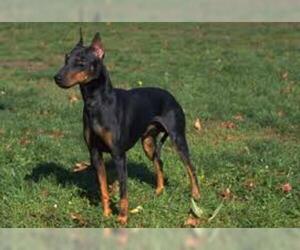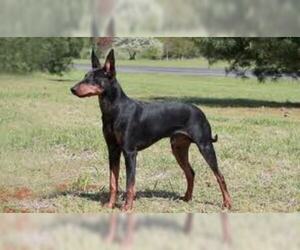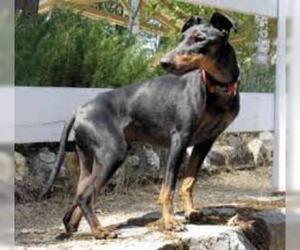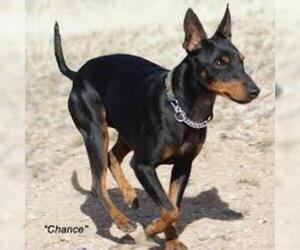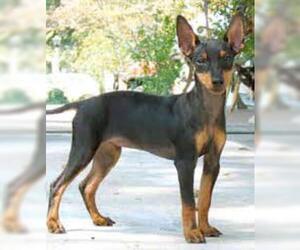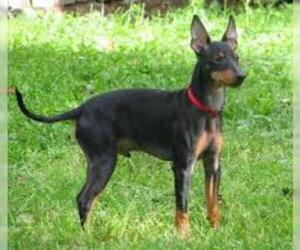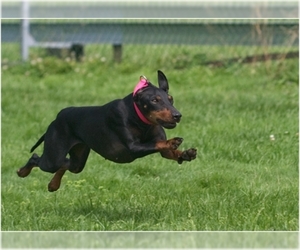
All about Manchester Terrier (Standard) dog breed
A.K.A. :Manchester, Standard Manchester, MT, Black and Tan Terrier, English Manchester, Gentleman’s Terrier, Ratting Terrier, Manchester Pup, Manchester Companion, British Toy Hunter, Urban Terrier, Velvet Hunter, Manc Terrier, Manchester Scout
Size
Grooming requirements
Exercise requirements
Good with other dogs
Watchdog ability
Energetic
Training requirements
Playful
Affectionate
Good with other pets
Good with children
Good with strangers
Winter
Summer
Healthiness
Protective
Life Span
| Pure Breeds | Member |
| Breeds A - Z | M |
| Breeds by Group | Terrier |
| Breeds by Trait | Hypoallergenic Low Shedding Smartest Dog Breeds |
| Overview: | The Manchester Terrier (Standard) is a sleek and spirited breed originating from 19th-century Manchester, England, initially bred for ratting and companionship. Physically, they are characterized by their elegant, compact build, smooth, glossy black coat with distinct mahogany tan markings, and keen, intelligent eyes. Their temperament is a delightful blend of energetic and affectionate; they are alert, intelligent, and loyal, possessing a strong "terrier" drive but often exhibiting a more refined and less boisterous nature than some of their cousins. Manchester Terriers can make wonderful family pets for those who appreciate an active and engaging companion, and their relatively moderate size and clean habits can make them surprisingly suitable for apartment living, provided they receive adequate exercise and mental stimulation. Owners should be aware of potential health considerations such as Von Willebrand's Disease and glaucoma, making responsible breeding and regular veterinary check-ups important. |
F.A.Q.
All You Need to Know About the Manchester Terrier (Standard) Breed
The sleek and spirited Manchester Terrier (Standard) is a captivating breed originating from England, initially bred for ratting. Known for their elegant, black-and-tan short coat, they possess a confident yet playful temperament, often described as bright, keen, and devoted. These medium-sized dogs are highly intelligent and trainable, making them excellent companions for active individuals or families seeking an engaging pet. While they can adapt to apartment living with sufficient daily exercise, a fenced yard is ideal for their energetic bursts. Their short coat is remarkably low-maintenance, requiring only occasional brushing. However, their intelligence and energy demand regular mental stimulation and physical activity to prevent boredom. Generally healthy, potential owners should be aware of common breed-specific health considerations like Glaucoma and von Willebrand's Disease. Overall, the Manchester Terrier (Standard) offers a lively, loyal, and relatively easy-care addition to the right home.The average weight for an adult Manchester Terrier (Standard) is typically between 12 to 22 pounds. While there isn't a significant difference between sexes, males often fall into the higher end of this range, and females the lower. This makes them a medium-small breed, with a healthy weight for Manchester Terrier (Standard) being within these guidelines.
Wondering how tall is a Manchester Terrier (Standard)? When considering a Manchester Terrier (Standard), understanding their average height is key for potential owners comparing breed sizes.
The average height of a Manchester Terrier (Standard), measured at the shoulder, typically ranges from 15 to 16 inches (approximately 38 to 41 cm) for both males and females. This makes them a medium-sized terrier breed, agile and compact.While this range provides a good guideline for the Manchester Terrier (Standard) height, slight variations can occur due to individual genetics and overall bone structure. Gender typically does not play a significant role in height differences within this breed, as both sexes tend to fall within the same specified range. Reputable breeders strive for dogs that meet the breed standard, which includes these height parameters.So, if you're looking for a dog around 15-16 inches tall, a Manchester Terrier (Standard) fits the bill perfectly! Their athletic build and moderate size make them suitable for various living situations.The Manchester Terrier (Standard) colors are officially recognized as black and tan. This classic combination features a glossy black coat with distinctive rich tan markings on the muzzle, throat, chest, forelegs, hind legs, and under the tail. The tan markings should be clearly defined and separate from the black. This is the AKC recognized Manchester Terrier (Standard) color and the only color accepted for show by major kennel clubs worldwide. There are no officially recognized rare or exotic variations.
The Manchester Terrier (Standard) personality is characterized by a lively, intelligent, and spirited disposition. They are devoted and loyal companions to their families, often forming strong bonds. While generally friendly with their own people, they can be reserved with strangers, though not typically aggressive. Their temperament of Manchester Terrier (Standard) includes a playful nature and a surprising adaptability. Despite their energy, they can adapt well to apartment living provided they receive sufficient daily exercise and mental stimulation. They are often good with children who are taught to respect them, but due to their terrier instincts, supervision is recommended, especially with very young children. Their prey drive means they may not always be ideal with other pets, particularly smaller ones, unless raised together from a young age with careful socialization. They thrive on attention and engagement, making them a rewarding breed for active individuals or families seeking a smart and courageous companion.
The Manchester Terrier (Standard) temperament is best described as spirited, intelligent, and affectionate. They are friendly and sociable with their families, forming strong, loyal bonds. While they can be reserved with strangers, proper early socialization helps them be more accepting. They are generally adaptable to apartment living given sufficient exercise, as they thrive on activity and mental stimulation.With children, they can be excellent companions for respectful, older children who understand how to interact with a dog, but close supervision is always recommended with very young children. Their high prey drive means they can be a challenge with other small pets like cats or rodents and require careful introduction and supervision. They tend to be stubborn at times due to their independent nature but are also highly intelligent and eager to please their loved ones, making them trainable with consistent, positive reinforcement. They are also quite sensitive to harsh corrections, so a gentle yet firm approach is best. Overall, they are a charming and engaging companion dog for active individuals or families seeking a devoted and lively canine partner.
Manchester Terrier (Standard) care involves moderate daily maintenance. This breed has a short, sleek coat, making grooming needs minimal; a weekly brush and occasional bath are sufficient. They are not a "low-energy dog breed" but do require regular, moderate exercise—daily walks and playtime are key to preventing boredom and maintaining a healthy weight. Dietary considerations should focus on high-quality dog food appropriate for their age and activity level, with portion control essential for weight management as they can be prone to obesity. Unlike some breeds, they generally don't have significant wrinkle and ear cleaning needs, but routine ear checks and nail trims are important. This breed is NOT brachycephalic; therefore, climate sensitivity due to brachycephalic anatomy is not a concern. However, their short coat means they can get cold easily in winter, so sweaters or coats are recommended in colder climates. Common health concerns include patellar luxation, Legg-Calve-Perthes disease, and von Willebrand's disease. Regular vet check-ups are crucial for early detection. Pay attention to skin issues, which can arise from allergies, and prioritize dental care with regular brushing to prevent periodontal disease. For potential adopters, knowing how to care for a Manchester Terrier (Standard) means committing to consistent training, socialization, and attentive healthcare. These health tips for Manchester Terrier (Standard) will help ensure a long, happy life with your companion.
The Manchester Terrier (Standard) activity level is moderately high. They are an energetic and agile breed that enjoys being active, but they also balance this with a strong desire for comfort and rest.Typical Energy Levels: Manchester Terriers (Standard) are known for their bursts of speed and playful antics. They have a good amount of stamina for their size but are not high-strung. They can go from active play to napping in a blink.Daily Exercise Needs: To keep a Manchester Terrier (Standard) happy and healthy, they require at least 30-60 minutes of dedicated exercise daily. This can include brisk walks, jogging, playing fetch, or interactive games in a secure area. They thrive on mental stimulation as well, so incorporating training sessions or puzzle toys is beneficial.Playtime Preferences: These dogs love to play! They enjoy chasing toys, digging (a natural terrier instinct), and engaging in interactive games with their owners. They are quite clever and enjoy activities that challenge their minds. They are excellent candidates for dog sports like agility, obedience, and earthdog trials.Limitations Due to Brachycephalic Anatomy: It's important to note that while the Manchester Terrier (Standard) has a short snout, they are not typically considered a brachycephalic breed like Bulldogs or Pugs. Their slightly shorter muzzle generally doesn't pose significant breathing challenges during moderate exercise. However, like any dog, they can overheat in extreme temperatures. Always monitor them during hot weather and ensure they have access to water and shade. Avoid strenuous exercise during the hottest parts of the day.How active are Manchester Terrier (Standard)? They balance short bursts of intense energy with longer periods of relaxed downtime. They are not dogs that need to be constantly on the go, but they also won't be content as couch potatoes. They enjoy a good run, but are equally happy curled up on the sofa next to their family.Suitability: Manchester Terriers (Standard) are suitable for active families who enjoy regular walks and playtime. They can also thrive in low-energy households if their owners are committed to providing their daily exercise requirements and mental stimulation. They are adaptable but need an owner who understands their need for both activity and affection. If you're looking for a dog that enjoys both adventure and snuggles, the Manchester Terrier (Standard) might be a great fit.
Manchester Terriers are not brachycephalic, so brachycephalic dog care is typically unnecessary. However, their lean build and high energy levels make them susceptible to heat sensitivity, especially during vigorous activity or warm weather. Providing hydration, shade, and rest breaks is essential. Spinal problems are uncommon but may occur with age or poor handling, particularly if the dog frequently jumps from furniture or stairs.
Understanding how to keep Manchester Terrier (Standard) healthy involves regular veterinary checkups, genetic screening for breed-specific conditions, joint support, consistent grooming, and safe exercise routines. With attentive care, Manchester Terriers can enjoy a lively, loyal life of 14–16 years.
Breed Breakdown: What Experts Say About the Manchester Terrier (Standard)
The Manchester Terrier (Standard) receives a rating of 3 for its "Size" trait.This rating reflects that the breed is decidedly on the smaller side, though not to the extreme of toy breeds. Standing typically around 15-16 inches tall and weighing between 12-22 pounds, they possess a sleek, athletic build that is compact and well-proportioned. Compared to most companion dog breeds, they are notably smaller than a Labrador or even a Beagle, and more akin to the size of a Miniature Pinscher or a slightly larger Jack Russell Terrier. Their modest dimensions make them an excellent choice for apartment living, as they don't require vast amounts of space. Their portable size is also a significant advantage for travel, easily fitting into pet carriers for car or air journeys. Households with space constraints will find the Manchester Terrier a particularly suitable companion, offering all the joy of a dog without the spatial demands of a larger breed.
I would rate the grooming requirements of the Manchester Terrier (Standard) breed as a 3.Manchester Terriers are a relatively low-maintenance breed when it comes to grooming. Their short, sleek, single coat sheds minimally and requires very little upkeep. A quick weekly brush with a rubber mitt or soft brush is usually sufficient to remove loose hairs and keep their coat shiny. They don't have undercoats that require extensive de-shedding. While their ears should be checked and cleaned regularly to prevent wax buildup and infections, this is standard care for most dog breeds and not particularly specialized. Nail trimming is also a routine requirement for all dogs, and their short coat means no special attention to paw hair is needed. They generally only need bathing when they are visibly dirty, as their coat is naturally quite clean and doesn't trap much dirt or odor. They are not particularly prone to skin folds requiring special cleaning, nor are they known for widespread susceptibility to skin issues or allergies that would necessitate frequent specialized grooming or medicated baths. Compared to many other companion dogs with long, double, or wire coats, the Manchester Terrier is quite easy to care for and requires far less frequent or specialized grooming.
I'd rate the "Exercise Requirements" of the Manchester Terrier (Standard) an 8 out of 10. This breed possesses a high energy level and a keen intelligence that necessitates more than just casual strolls. They thrive on consistent, structured activity that engages both their body and mind. Daily vigorous walks or jogs, ideally lasting at least 30-60 minutes, are essential, and they truly shine with opportunities for off-leash running in a secure area. Their stamina is quite good, and they can sustain movement for extended periods without significant respiratory limitations, as they are not a brachycephalic breed. Beyond physical exertion, Manchester Terriers benefit greatly from mentally stimulating exercises such as agility, obedience training, earthdog trials, or even simply engaging playtime with puzzle toys. Without adequate exercise and mental engagement, they can become bored, destructive, and even develop behavioral issues. They are definitely not a breed that thrives with minimal activity; rather, they require a dedicated owner who can provide the consistent routine and varied outlets for their considerable energy.
I would rate the "Watchdog Ability" of the Manchester Terrier (Standard) at a 7.Manchester Terriers are quite alert and observant, possessing keen senses that make them quick to notice anything out of the ordinary. They are known for their lively and spirited nature, which translates into a readiness to respond to unfamiliar sounds or people. When someone approaches their home, you can expect a Manchester Terrier to vocalize with a sharp, insistent bark. This isn't usually an incessant, nuisance bark, but rather a purposeful warning that signals their awareness and territorial instincts. While they are not typically aggressive or overly protective in the way some guardian breeds are, their confident demeanor and willingness to vocalize make them very effective at providing meaningful early warnings. They are certainly capable of deterring potential intruders with their alert barking, making them more than just a passive companion in a home environment. They're excellent "doorbells with attitude."
I would rate the "Good with Other Dogs" trait of the Manchester Terrier (Standard) breed a 6 out of 10.Manchester Terriers, while generally not inherently aggressive, often possess a strong terrier temperament that can manifest as a desire for dominance or a readiness to challenge other dogs, particularly those of similar size or energy levels. They are intelligent and form strong bonds with their human families, but their natural confidence and sometimes feisty nature mean they don't always instinctively thrive in canine company without proper guidance. With early and consistent socialization, they can learn to coexist peacefully and even enjoy the company of other dogs. However, they are not typically the type of dog to be universally dog-friendly or effortlessly blend into any multi-dog household. Careful introductions are crucial, and owners should be prepared to manage interactions, as a Manchester Terrier may assert themselves, especially with dogs they perceive as weak or challenging. They can adapt to multi-dog households, but success often hinges on the individual dog's personality, the temperament of the other dogs, and the owner's commitment to ongoing training and supervision to ensure peaceful coexistence rather than relying solely on the breed's innate sociability.
I would rate the "Energetic" trait of the Manchester Terrier (Standard) an 8 out of 10.This breed possesses a remarkably high level of energy, far from laid-back. They are naturally active, intelligent, and have a strong drive to participate. Their typical activity level is high, requiring significant daily exercise to prevent boredom and destructive behaviors. They have excellent endurance for their size and are incredibly playful, enjoying a wide range of activities from fetch to agility. Their need for physical stimulation is considerable, and they thrive on opportunities for vigorous outdoor play, long walks, and even dog sports. They are well-suited for athletic activities and can happily keep pace with active owners. Fortunately, the Manchester Terrier does not possess brachycephalic anatomy; their well-proportioned muzzle and airways mean they do not face the breathing difficulties or reduced stamina associated with flat-faced breeds, allowing them to fully engage in and enjoy their high-energy activities without compromise.
I'd rate the Manchester Terrier (Standard) "Training Requirements" a 7. They are an intelligent and generally eager-to-please breed, which can make them quite responsive to training. However, their terrier nature means they possess a significant degree of stubbornness and independent thought. This isn't a "soft" breed that will crumble under pressure, and they can definitely try to outsmart their handler if given the chance. Their attention span is usually good, especially when the training is engaging and varied, but they can become bored with repetitive drills. They respond very well to positive reinforcement and praise, thriving on a clear, consistent reward system. Correction needs to be fair and timely, as harsh methods will often result in a shut-down or a dog who actively resists. While not impossible for a beginner, they are definitely *not* the easiest first-time dog. They benefit immensely from an owner who understands terrier psychology, is patient yet firm, and is committed to structured, consistent routines from puppyhood. An experienced owner who can make training fun and engaging while setting clear boundaries will find them a highly capable and well-behaved companion.
I would rate the Playful trait of the Manchester Terrier (Standard) a solid 9.This breed is a little dynamo, embodying the very definition of "playful." They possess a naturally spirited and enthusiastic nature, far from laid-back compared to many other companion dogs. Manchester Terriers have a high typical activity level and an undeniable love for games and interaction, which they often initiate themselves. Their attention-seeking behavior frequently manifests as a desire to engage in play, and they respond to toys and playtime with an almost unmatched intensity and joy. Whether it's a vigorous game of fetch, a tug-of-war, or simply chasing after a squeaky toy, their overall enthusiasm in daily life is palpable and infectious. They thrive on mental and physical stimulation, making playtime a crucial aspect of their happiness and well-being.
I would rate the Affectionate trait of the Manchester Terrier (Standard) a 7 out of 10.While not overly demonstrative in the way some breeds might be, the Manchester Terrier is deeply devoted to its family and forms strong bonds. They have a strong desire for human companionship and will typically follow their family members from room to room, preferring to be in the same space. They are definitely loyal and sensitive to their owner's emotions, offering quiet support or playful antics as needed. They enjoy physical closeness, particularly when relaxing, and will often seek out a lap or a spot next to you on the sofa. However, they aren't typically "in your face" cuddlers and maintain a dignified air. They thrive on affection and praise from their loved ones, but they also possess a degree of independence and aren't clingy, making them more balanced than some other extremely people-oriented companion dogs.
I would rate the "Good with Other Pets" trait of the Manchester Terrier (Standard) an 8 out of 10.Manchester Terriers, while possessing a typical terrier prey drive, are generally quite adaptable and can coexist peacefully with other pets, especially when properly socialized from a young age. They are often good with other dogs, enjoying playtime and companionship, and can learn to live with cats if introduced carefully and at an early age. Their intelligence makes them responsive to training, which is crucial for managing their prey drive and ensuring polite interactions. While they aren't inherently "live and let live" with every creature, they are not typically aggressive or prone to extreme resource guarding. Consistent supervision, particularly during initial introductions to smaller, unfamiliar animals, is always recommended due to their terrier instincts, but with the right guidance, they can become cherished members of a multi-pet household.
The Manchester Terrier (Standard) rates a 6 out of 10 for "Good with Children."While generally loyal and affectionate with their own families, Manchester Terriers are not inherently "naturally gentle and affectionate" in the same way some other breeds are. They possess a strong prey drive and can be quite energetic and boisterous, especially as puppies. They have a terrier temperament, meaning they can be feisty, determined, and sometimes a bit intolerant of rough handling or overly rambunctious play. For older, more respectful children who understand how to interact with a dog and can participate in training, a Manchester Terrier can be a wonderful and playful companion. They enjoy engaging in games and can be very loyal. However, their patience for very young children who might pull ears or tails, make sudden loud noises, or not understand boundaries is limited. They require significant early socialization and consistent positive reinforcement training to thrive in a family setting, particularly one with children. Supervision is always recommended, especially with younger kids, to ensure both the dog's and the child's safety and well-being. They aren't prone to aggression, but their independent nature and lower tolerance for typical toddler antics mean they aren't the best fit for first-time dog owners with small children seeking an exceptionally laid-back, "bomb-proof" family dog.
Rating the "Good with Strangers" trait of the Manchester Terrier (Standard) breed on a scale of 1 to 10, I would give them a 6.The Manchester Terrier is generally not an extremely sociable and welcoming dog with unfamiliar adults right off the bat, but they are far from highly reserved or unfriendly. They tend to be a bit watchful and discerning, often observing new people before deciding to engage. Their terrier heritage gives them a degree of independence and a slightly aloof nature with strangers, rather than an immediate eagerness to greet. While they aren't typically prone to aggressive guarding, their alert nature means they might bark to announce a visitor. With proper early socialization, they can become quite adaptable and tolerant in public or guest-filled environments, and may even warm up to strangers who are polite and not too pushy. However, they are not naturally outgoing in the way some retriever breeds are; their comfort with strangers often requires consistent exposure and positive training, rather than being an inherent trait. They are generally polite but rarely effusive with people they don't know well.
Rating: 3Explanation: The Manchester Terrier (Standard) is a sleek, short-coated breed with very little body fat, making them highly sensitive to cold weather. Their fine, single coat offers minimal insulation against low temperatures, and their relatively small to medium size means they lose body heat more quickly than larger breeds. They are not brachycephalic, so breathing in cold air isn't an issue, but their lack of natural protection against the elements significantly increases their risk of hypothermia. They will quickly become uncomfortable and shiver in cold climates, and their ability to safely enjoy outdoor activity is severely limited without significant protection.Compared to many other companion dogs, the Manchester Terrier requires considerable special care during winter months. They are not suited for prolonged outdoor exposure in cold weather and will need a warm coat or sweater even for short walks. Indoor environments must be kept warm, and they should never be left outside unattended in cold temperatures. Owners in colder climates should be particularly diligent about providing warmth and limiting their exposure to the elements.
I would rate the "Summer" tolerance of the Manchester Terrier (Standard) at a 7.This rating reflects that while the Manchester Terrier is not as heat-sensitive as many brachycephalic breeds, it's certainly not impervious to high temperatures. Their short coat offers minimal insulation, and their generally active nature means they can easily overexert themselves in the heat. They do not possess the extreme respiratory challenges of brachycephalic breeds, allowing for more efficient panting. However, like most dogs, they are susceptible to heatstroke if not managed carefully. They require special care in summer months compared to more cold-hardy or heat-tolerant breeds, primarily meaning careful monitoring of outdoor activity, especially during peak heat hours. Owners should provide ample shade and water, and avoid strenuous exercise in the midday sun. While not requiring constant air conditioning like some breeds, access to a cool indoor environment is essential on hot days to prevent overheating.
I would rate the "Healthiness" trait of the Manchester Terrier (Standard) at an 8 out of 10. This breed is generally considered robust and healthy, especially when compared to many other companion dogs that often face more severe or numerous breed-specific issues. They boast a good life expectancy of 12-16 years, which is on the higher end for their size. While no breed is entirely free of health concerns, the Manchester Terrier's genetic predispositions are fewer and often less debilitating. Common issues can include some eye conditions like glaucoma or juvenile cataracts, and occasional joint problems such as patellar luxation, but these are not widespread and responsible breeding practices significantly reduce their prevalence. They are not known for the breathing difficulties common in brachycephalic breeds, nor for widespread skin conditions or severe orthopedic problems. With proper preventive care and a conscientious breeder, Manchester Terriers are generally low-maintenance in terms of health, rarely requiring extensive or specialized medical intervention throughout their lives.
I would rate the "Protective" trait of the Manchester Terrier (Standard) at a 6.The Manchester Terrier is an exceptionally alert breed with keen senses, making them excellent watchdogs who will reliably sound the alarm at anything unusual. Their territorial instincts are present, and they are fiercely loyal to their owners, readily forming a strong bond. When it comes to strangers, they are typically reserved and can be suspicious, taking their time to warm up. However, their protectiveness manifests more in their vigilant nature and their willingness to bark and alert, rather than as a physically confrontational guardian. While they possess a confident and sometimes feisty demeanor, their relatively small size and build mean they are generally not capable of offering meaningful physical protection in a household setting beyond being a very effective "doorbell." They are primarily companion dogs, and while their alertness is a form of protection, they are not a guard dog breed designed for physical defense.
I would rate the "Life Span" trait of the Manchester Terrier (Standard) breed as an 8.Manchester Terriers are generally considered a long-lived breed compared to many other companion dogs. Their average life expectancy typically falls in the range of 12 to 15 years, with many individuals living well beyond this. While they do have some genetic predispositions, such as Von Willebrand's Disease and occasionally patellar luxation, these are often manageable with responsible breeding practices and early detection. The breed is not particularly prone to a wide array of devastating or early-onset conditions that significantly shorten their lifespan. Good nutrition, regular exercise, and consistent veterinary care further contribute to their longevity. They are certainly not a short-lived breed, and their robust nature often sees them enjoying a good quality of life into their senior years.
Manchester Terrier (Standard) Dogs for adoptionSee all dogs for adoption
Similar Dog Breeds for Manchester Terrier (Standard)
Quick Breed Selector 0 - not important, 1 - smallest, 10 - largest
Variants & Mistakes :Manchaster Terrier Standard, Manchestir Terrier Standard, Manchestur Terrier Standard, Manchesterr Terrier Standard, Manchesther Terrier Standard, Manchestyer Terrier Standard, Manchestear Terrier Standard, Manchestur Terier Standard, Manchestir Terier Standard, Manchaster Terier Standard, Manchestur Terrior Standard, Manchestir Terrior Standard, Manchaster Terrior Standard, Manchestur Terrer Standard, Manchestir Terrer Standard, Manchaster Terrer Standard, Manchestur Terrar Standard, Manchestir Terrar Standard, Manchaster Terrar Standard, Manchestur Teror Standard, Manchestir Teror Standard, Manchaster Teror Standard, Manchestur Teriar Standard, Manchestir Teriar Standard, Manchaster Teriar Standard, Manchestur Terirer Standard, Manchestir Terirer Standard, Manchaster Terirer Standard
